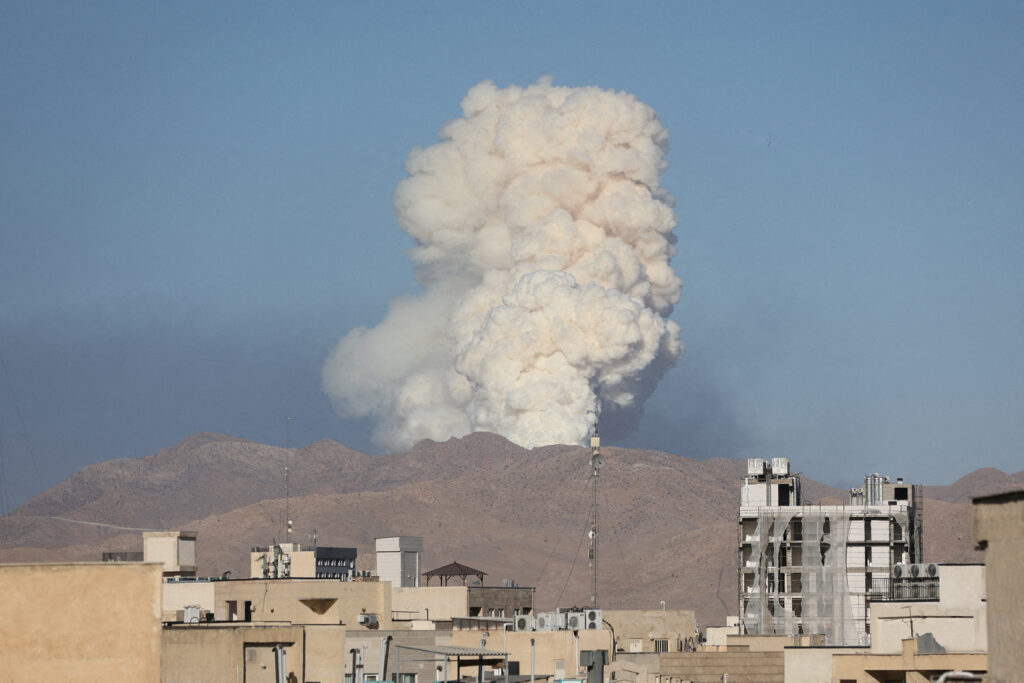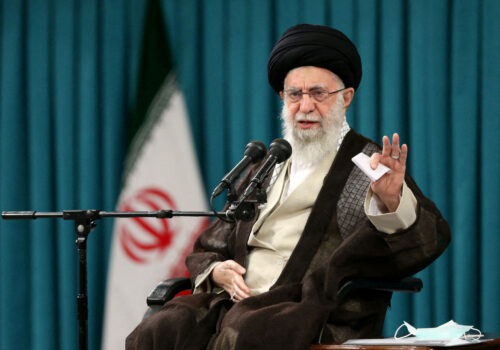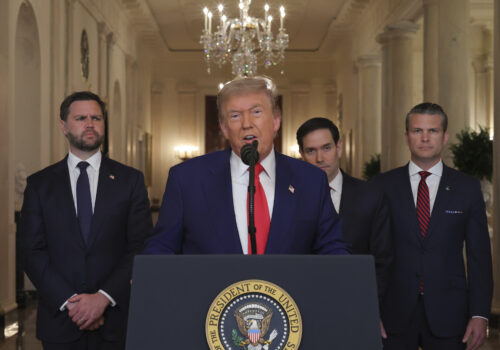GET UP TO SPEED
“We have to respond.” Though he did not specify how, Iran’s foreign minister made clear on Sunday that his country will retaliate after the United States bombed three nuclear sites overnight. What’s Tehran thinking now? How could this conflict escalate? Our experts have the answers below.
TODAY’S EXPERT REACTION BROUGHT TO YOU BY
- William Wechsler (@WillWechsler): Senior director of the Council’s Middle East Programs and former US deputy assistant secretary of defense for special operations and combatting terrorism
- Jonathan Panikoff (@jpanikoff): Director of the Council’s Scowcroft Middle East Security Initiative and former US deputy national intelligence officer for the Near East
- Tressa Guenov: Director for programs and operations and senior fellow at the Council’s Scowcroft Center for Strategy and Security, and former US principal deputy assistant secretary of defense for international security affairs
Two paths
- Iran’s supreme leader, Ayatollah Ali Khamenei, has two strategic choices, Will tells us. The first is to “negotiate directly and immediately with Trump to end the conflict,” which would require Iran accepting a deal to forego any nuclear enrichment—civilian or military—and perhaps restrict the malign activities of its regional proxy groups, though that would be difficult to enforce. “In return,” Will adds, “Iran would require Trump to give Israel a firm and public red light against any further strikes on Iran.”
- The second option, Will says, is to escalate the conflict by “targeting US forces in the region, attacking energy resources across the Gulf or shipping in the Strait of Hormuz, or conducting terrorism against Americans around the world.” (The Iranian Parliament reportedly has already approved the closure of the Strait should the country’s leaders decide to follow through on the move.) That, in turn, could lead the United States and Israel to broaden their campaign against Iranian military, energy, economic, and political targets.
- “It is sadly easy to imagine the horrible destruction that would rain down on Iran in this second scenario,” Will observes. “But it is nearly impossible to see the regime surviving it—and what would succeed the regime is profoundly unpredictable at this point.”
Sign up to receive rapid insight in your inbox from Atlantic Council experts on global events as they unfold.
Tehran vs. Trump
- On Saturday night, Trump told Americans that Iran “must now make peace. If they do not, future attacks would be far greater and a lot easier.” Jonathan notes that the regime likely heard the speech “as another threat rather than as an opening for diplomacy.”
- Jonathan hopes that the United States is working diplomatic backchannels to offer Iran a face-saving way out of the crisis, and Pentagon officials indicated on Sunday that there is ongoing private communication between the two sides. “Without something to be able to claim a reason for a lesser response, hardliners in the Iranian regime may ultimately win the day, which could lead to a much more dangerous outcome,” he tells us.
- On Sunday, Dan Caine, the chairman of the joint chiefs of staff, told reporters that the Iranian nuclear sites suffered “severe damage and destruction,” but the full effect on Iran’s nuclear program is not yet clear. Tressa points out that such an assessment will require more intelligence, and “the scope of the damage will also affect how Iran reacts next and whether Tehran will look to use asymmetric options such as launching cyberattacks or activating sleeper cells or militias.”
- Jonathan says that if the damage to Iran’s nuclear program ultimately is limited—perhaps because Iran has other secret sites or was able to move important material—“then it is unlikely this will be the end.”
The view in Moscow
- The US attack will raise fresh fears in Russia about the Iranian regime’s stability, Tressa predicts, given Iran’s support for Russia’s war in Ukraine with Shahed drones “that have wrought horrific damage against Ukrainian troops and civilians.”
- “With the fall of the regime of Bashar al-Assad in Syria and with Tehran on its heels, Russia’s influence in the Middle East is more tenuous than ever,” Tressa says. But “in the end, it’s not likely that Putin will do much to save Iran, and we should not expect him to return the favor by actively arming or assisting Tehran militarily.”
Further reading
Sun, Jun 22, 2025
Trump made the right call. Will Khamenei do the same?
New Atlanticist By William F. Wechsler
The Iranian regime is in a fundamentally weak position, and it should leap at this last opportunity to save itself.
Sat, Jun 21, 2025
Experts react: The United States just bombed Iran’s nuclear sites. Here’s what to expect next.
New Atlanticist By
Early on Sunday morning in the Middle East, US forces targeted Fordow, Natanz, and Isfahan. Atlantic Council experts survey the fallout for Iran and for the region.
Sat, Jun 14, 2025
Israel’s Iran strike provides a historic chance for Middle East realignment
Inflection Points By Frederick Kempe
History will remember this moment less for the Israeli strikes themselves and more for what follows.
Image: Smoke rises following an Israeli attack in Tehran, Iran, June 18, 2025. Majid Asgaripour/WANA (West Asia News Agency) via REUTERS



